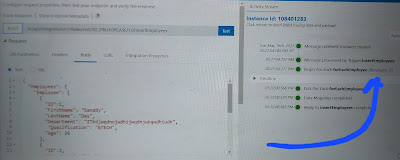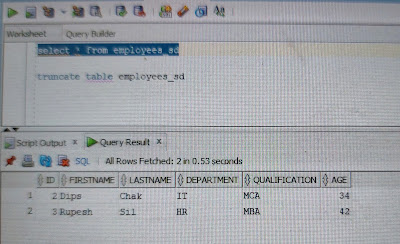Use Case: We have multi Records are of Different types CSV file. How we can create a schema for the same and read via oracle integrarion.
File to be read: InputSourceData.txt
Invoice,header1, header2,header3,header4
Invoice Line, Line1,Line2,Line3,Line4,Line5,Line6,Line7,Line8
Invoice Line, Line1,Line2,Line3,Line4,Line5,Line6,Line7,Line8
Invoice Line, Line1,Line2,Line3,Line4,Line5,Line6,Line7,Line8
Invoice Line, Line1,Line2,Line3,Line4,Line5,Line6,Line7,Line8
Invoice,header1, header2,header3,header4
Invoice Line, Line1,Line2,Line3,Line4,Line5,Line6,Line7,Line8
Invoice Line, Line1,Line2,Line3,Line4,Line5,Line6,Line7,Line8
Invoice Trailer, Trailer1
Notes: This case, we have following 3 types of records and 1st column values are fixed which would be our conditionValue while generating the xsd. >>
- Invoice (Header)
- Invoice Line(Line)
- Invoice Trailer(Trailer)
Implementation steps:
Step1: Create XSD from Jdeveloper tool
Create a SOA project and open composite.xml canvas and drag and drop a File adapter:
XSD is generated but while you tested the C1 or column 1 value for each record is missing due to have conditionValue attribute. Here we modify the code little to add the column 1 fixed or default values:
For each record add the below line and it works:
<xsd:element name="C1" type="xsd:string" default="Invoice"/>
The Modified XSD:
<?xml version="1.0" encoding="UTF-8" ?>
<xsd:schema xmlns:xsd="http://www.w3.org/2001/XMLSchema" xmlns:nxsd="http://xmlns.oracle.com/pcbpel/nxsd" xmlns:tns="http://TargetNamespace.com/fileReference" targetNamespace="http://TargetNamespace.com/fileRefeference" elementFormDefault="qualified" attributeFormDefault="unqualified" nxsd:version="NXSD" nxsd:stream="chars" nxsd:encoding="US-ASCII">
<xsd:element name="Root-elememt">
<xsd:complexType>
<xsd:choice minOccurs="1" maxOccurs="unbounded" nxsd:choiceCondition="terminated" nxsd:terminatedBy=",">
<xsd:element name="RECORD1" nxsd:conditionValue="Invoice">
<xsd:complexType>
<xsd:sequence>
<xsd: element name="C1" type="xsd:string" default="Invoice"/>
<xsd: element name="C2" type="xsd:string" nxsd:style="terminated" nxsd:terminatedBy="," nxsd:quotedBy="""/>
<xsd: element name="C3" type="xsd:string" nxsd:style="terminated" nxsd:terminatedBy="," nxsd:quotedBy="""/>
<xsd: element name="C4" type="xsd:string" nxsd:style="terminated" nxsd:terminatedBy="," nxsd:quotedBy="""/>
<xsd: element name="C5" type="xsd:string" nxsd:style="terminated" nxsd:terminatedBy="${eol}" nxsd:quotedBy="""/>
</xsd:sequence>
</xsd:complexType>
</xsd:element>
<xsd:element name="RECORD2" nxsd:conditionValue="Invoice Line">
<xsd:complexType>
<xsd:sequence>
<xsd: element name="C1" type="xsd:string" default="Invoice Line"/>
<xsd: element name="C2" type="xsd:string" nxsd:style="terminated" nxsd:terminatedBy="," nxsd:quotedBy="""/>
<xsd: element name="C3" type="xsd:string" nxsd:style="terminated" nxsd:terminatedBy="," nxsd:quotedBy="""/>
<xsd: element name="C4" type="xsd:string" nxsd:style="terminated" nxsd:terminatedBy="," nxsd:quotedBy="""/>
<xsd: element name="C5" type="xsd:string" nxsd:style="terminated" nxsd:terminatedBy="," nxsd:quotedBy="""/>
<xsd: element name="C6" type="xsd:string" nxsd:style="terminated" nxsd:terminatedBy="," nxsd:quotedBy="""/>
<xsd: element name="C7" type="xsd:string" nxsd:style="terminated" nxsd:terminatedBy="," nxsd:quotedBy="""/>
<xsd: element name="C8" type="xsd:string" nxsd:style="terminated" nxsd:terminatedBy="," nxsd:quotedBy="""/>
<xsd: element name="C9" type="xsd:string" nxsd:style="terminated" nxsd:terminatedBy="${eol}" nxsd:quotedBy="""/>
</xsd:sequence>
</xsd:complexType>
</xsd:element>
<xsd:element name="RECORD3" nxsd:conditionValue="Invoice Trailer">
<xsd:complexType>
<xsd:sequence>
<xsd: element name="C1" type="xsd:string" default="Invoice Trailer "/>
<xsd: element name="C2" type="xsd:string" nxsd:style="terminated" nxsd:terminatedBy="${eol}" nxsd:quotedBy="""/>
</xsd:sequence>
</xsd:complexType>
</xsd:element>
</xsd:choice>
</xsd:complexType>
</xsd:element>
</xsd:schema>
Step2: Create a scheduled orchestration integration and drag and drop a FTP adpater connection and read the file using this created schema.
Activate and test.






































